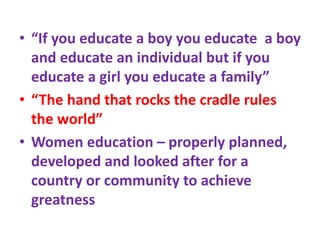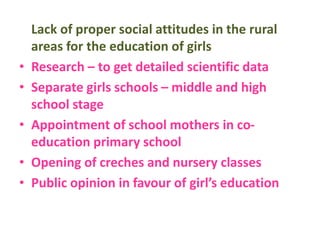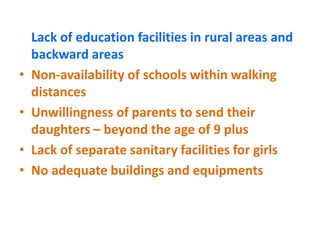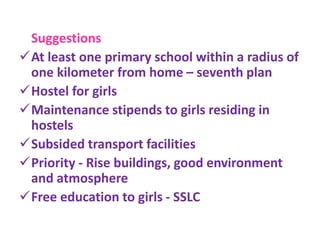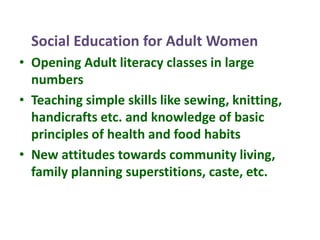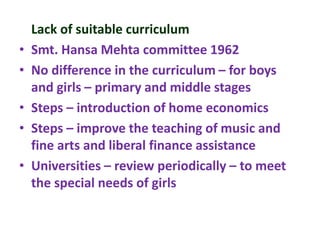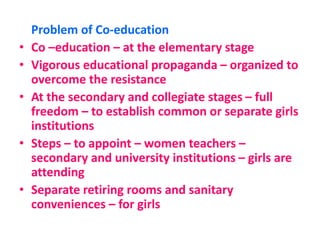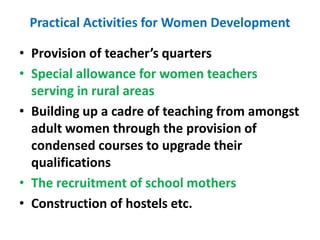Women education
- 2. 5.1 Women Education Meaning, Objectives and Importance. Significant Problems of Women, Place of Women in Economic and National Development, Practical Activities for Women Development
- 3. Meaning • Providing for all facilities and opportunities for learning of females on par with those available for the education of males • Based on the socio-economic status – Those below the poverty line Those who struggle for retaining the middle class status and economic security Those who enjoy good and stable economic security
- 4. Objectives • NCERT (1976) - Home Management Dignity of Labour Equal Commitments Equal opportunities Decision Making Self-Dependence Legal Rights
- 5. • Participation in Public Affairs • Equal Rights not for confrontation • Increasing Productivity • Giving up the Fascination for Personalwares • Developing Achievement Motivation
- 6. Importance • Women’s education plays an important role in the progress of any nation • Constitute 50% of the population – providing proper educational opportunities for all women • Swami Vivekananda – • Education of a male benefits him largely, educating a girl is equivalent to educating her entire family
- 7. • Mahakavi Bharathi – • This world can prosper only if women are all educated on par with men • Gandhiji – • Women should receive education on par with men, if necessary provide them specialized education
- 8. • “If you educate a boy you educate a boy and educate an individual but if you educate a girl you educate a family” • “The hand that rocks the cradle rules the world” • Women education – properly planned, developed and looked after for a country or community to achieve greatness
- 9. • Independence – turned upside down • Kothari Commission – • “For full development of our human resources, the improvement of homes and for moulding the character of children during the most impressionable years of infancy, the educate of women is of even greater importance than that of men”
- 10. Problems of Women’s Education • There is acute dearth of trained female teachers • The curriculum is not suited to their special requirements • Women have not achieved social consciousness to move freely with men in work spots and outside the home • Poverty and ignorance of parents also block the educational advancement of girls
- 11. Factors adversely affecting Education of Women • Hang over of tradition • Poverty • Lack of qualified women teachers • Curricula being followed generally do not cater to special needs and interests of girls
- 12. Causes of slow progress of Women Education and Suggestive Measures • Economic backwardness of the rural community • Lack of proper social attitudes in the rural areas for the education of girls • Lack of education facilities in rural areas • Lack of women teachers
- 13. • Lack of proper supervision and guidance due to inadequate women personnel in the inspectorate • Lack of proper incentives to parents and children • Lack of adequate incentives • Lack of suitable curriculum • Co-educational aspects
- 14. Economic backwardness of the rural community • Provision of free cloths and books • Make students to come regularly, attendance scholarships can be provided • Free mid-day meals
- 15. Lack of proper social attitudes in the rural areas for the education of girls • Research – to get detailed scientific data • Separate girls schools – middle and high school stage • Appointment of school mothers in co- education primary school • Opening of creches and nursery classes • Public opinion in favour of girl’s education
- 16. Lack of education facilities in rural areas and backward areas • Non-availability of schools within walking distances • Unwillingness of parents to send their daughters – beyond the age of 9 plus • Lack of separate sanitary facilities for girls • No adequate buildings and equipments
- 17. Suggestions At least one primary school within a radius of one kilometer from home – seventh plan Hostel for girls Maintenance stipends to girls residing in hostels Subsided transport facilities Priority - Rise buildings, good environment and atmosphere Free education to girls - SSLC
- 18. Lack of women teachers Large number of training institutions – provided Accomodation to women teachers, quarters – 7th plan - 50% Adequate rural allowance not less than Rs. Fifty per month Special stipends – girls in high schools with aptitude for teaching Husband and wives – posted in the same place Free training – stipends – candidate of training institutions Untrained teachers – two years – given an in- service training of education – considered as on duty
- 19. Lack of proper supervision and guidance • Increase in the number of women inspecting officers • District women inspecting officers – adequate transport facilities • Adequate office staff and equipment • Residential facilities • Closer contact with rural areas – state council – provide funds
- 20. Social Education for Adult Women • Opening Adult literacy classes in large numbers • Teaching simple skills like sewing, knitting, handicrafts etc. and knowledge of basic principles of health and food habits • New attitudes towards community living, family planning superstitions, caste, etc.
- 21. Lack of Adequate Incentives to Students • Number of attendance scholarships – doubled in 7th plan • Allowance of school mothers – enhanced to Rs. 20 per month • Maintenance stipends – doubled in 7th plan • Sanitary blocks in co-educational primary schools – increased in 7th plan • Construction of girls hostel – allocation of fund – provided adequately - 7th plan
- 22. Lack of suitable curriculum • Smt. Hansa Mehta committee 1962 • No difference in the curriculum – for boys and girls – primary and middle stages • Steps – introduction of home economics • Steps – improve the teaching of music and fine arts and liberal finance assistance • Universities – review periodically – to meet the special needs of girls
- 23. Problem of Co-education • Co –education – at the elementary stage • Vigorous educational propaganda – organized to overcome the resistance • At the secondary and collegiate stages – full freedom – to establish common or separate girls institutions • Steps – to appoint – women teachers – secondary and university institutions – girls are attending • Separate retiring rooms and sanitary conveniences – for girls
- 24. Practical Activities for Women Development • Provision of teacher’s quarters • Special allowance for women teachers serving in rural areas • Building up a cadre of teaching from amongst adult women through the provision of condensed courses to upgrade their qualifications • The recruitment of school mothers • Construction of hostels etc.







